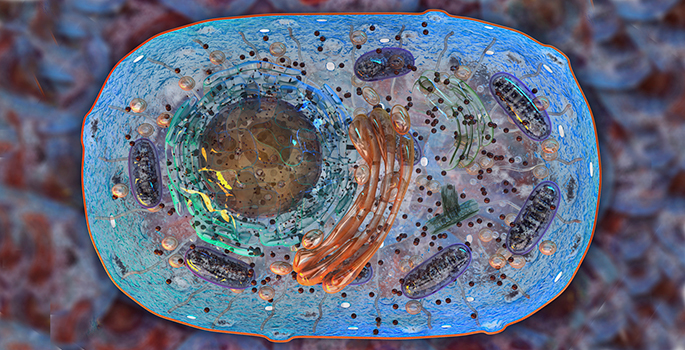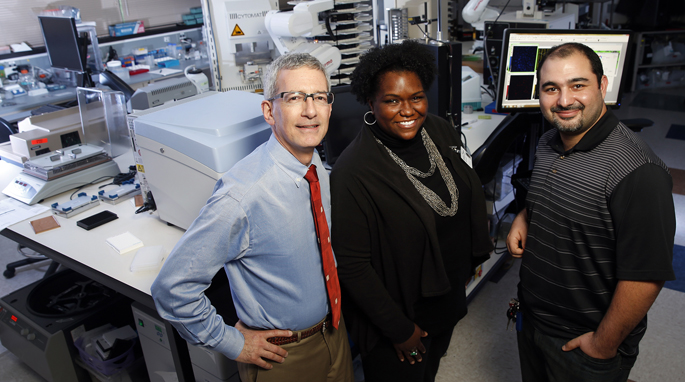Molecular Physiology & Biophysics
-

Award bolsters study of alcohol’s impact on the brain
Vanderbilt University researcher Danny Winder, Ph.D., has received a MERIT Award from the National Institute of Alcohol Abuse and Addiction (NIAAA), part of the National Institutes of Health, for his contributions to understanding how alcohol affects the brain. Read MoreJul 28, 2016
-

Diabetes drugs may ease addiction
Drugs that are being used clinically to treat obesity and diabetes may also have a role in treating drug abuse. Read MoreJul 18, 2016
-

Membrane fats impact drug transporter
New studies of a membrane transporter could explain antibiotic resistance – and lead to novel ways to combat it. Read MoreJul 14, 2016
-

When mitochondrial genes act up
A team of Vanderbilt scientists have identified some of the methods that mutant mitochondrial DNA use to circumvent the molecular mechanisms that cells use to regulate mitochondrial activity. Read MoreJul 12, 2016
-

Vanderbilt mourns loss of diabetes research icon ‘Rollo’ Park
Charles Rawlinson “Rollo” Park, M.D., a pioneering diabetes researcher at Vanderbilt University Medical Center, died Saturday, May 7, at his home in Brentwood, just two months after celebrating his 100th birthday on March 2. Read MoreMay 12, 2016
-

Gannon to chair ADA science session planning committee
Maureen Gannon, Ph.D., associate professor of Medicine, has been appointed chair of the American Diabetes Association (ADA) Scientific Session planning committee. Read MoreMay 5, 2016
-

Nobel laureate Lefkowitz set for next Discovery Lecture
Robert Lefkowitz, M.D., who shared the 2012 Nobel Prize in Chemistry for his studies of G protein-coupled receptors (GPCRs), will deliver the next Flexner Discovery Lecture on March 31. Read MoreMar 24, 2016
-

Study tracks brain’s trigger for overeating high-fat food
Disruptions in a specific signaling pathway in the brain can cause overeating of high-fat food, researchers at Vanderbilt University have found. Read MoreSep 24, 2015
-

Altered dopamine signaling may offer a clue to autism
Newly discovered genetic variations linked to autism spectrum disorder (ASD) disrupt the function of the dopamine transporter, suggesting that altered dopamine signaling contributes to this common developmental condition, according to a Vanderbilt University-led research team. Read MoreJan 29, 2015
-

New signaling pathway provides clues to obesity
A Vanderbilt University-led research team has discovered a molecular “rheostat” in the brain’s appetite control center that may provide new insights into obesity, which is at epidemic levels in this country. Read MoreJan 22, 2015
-

Neuert receives New Innovator Award from NIH
Vanderbilt University biophysicist Gregor Neuert, Ph.D., M.Eng., is among 50 recipients of the 2014 National Institutes of Health (NIH) Director’s New Innovator Award. Each award provides up to $1.5 million in direct research support over five years. Read MoreOct 9, 2014
-

Team spots key regulator for cholesterol production
A Vanderbilt University-led research team has discovered a “master regulator” for cholesterol production and transport in the liver — a tiny piece of RNA called microRNA-223. Read MoreOct 2, 2014
-

Team takes 4-D look at brain receptor’s role
Reporting last week in the journal Cell, researchers from Oregon Health and Science University, Harvard Medical School and Vanderbilt University describe the first “four-dimensional” picture of a brain receptor that plays a key role in learning and memory. Read MoreAug 14, 2014
-

CaMKII enhances insulin secretion
The protein CaMKII acts as a calcium sensor in a positive feedback pathway that enhances glucose-stimulated insulin secretion. Read MoreMay 14, 2014
-

Relaxin combats insulin resistance
The hormone relaxin may offer a novel approach for treating diet-induced insulin resistance. Read MoreOct 16, 2013
-

Intracellular receptor expert set for next Discovery Lecture
Keith Yamamoto, Ph.D., an international leader in the study of signaling and gene regulation by intracellular receptors, will deliver the next Flexner Discovery Lecture on Thursday, Oct. 10. Read MoreOct 3, 2013
-

Disease linked to cell traffic jams
Diseases associated with mutations and changes in expression of the protein caveolin may result from faulty trafficking of the protein to the cell surface. Read MoreJun 20, 2013
-

Food variety drives overeating in mouse model of obesity syndrome
Dietary variety – not high-fat or sugary foods – appears to stimulate overeating in a mouse model of an inherited obesity syndrome. Read MoreApr 25, 2013
-

UT Southwestern’s Brown set to deliver Flexner Discovery Lecture
Nobel laureate Michael Brown, M.D., whose research paved the way for the development of cholesterol-lowering statin drugs, will deliver the next Flexner Discovery Lecture on Thursday, April 25. Read MoreApr 18, 2013
-

VU, GlaxoSmithKline team to develop novel treatments for severe obesity
Vanderbilt University has signed a collaboration agreement with GlaxoSmithKline (GSK) for the discovery, development and commercialization of novel therapies for severe obesity. Read MoreFeb 11, 2013